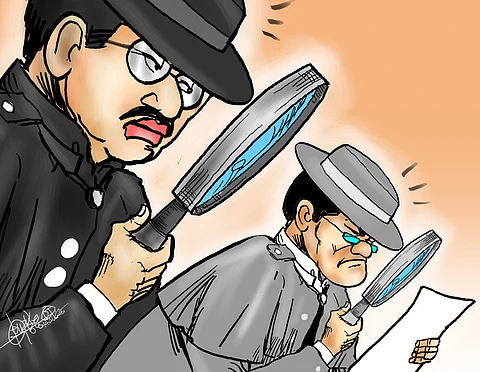
- NEWS
- the EDIT
- COMMENTARY
- BUSINESS
- LIFE
- SHOW
- ACTION
- GLOBAL GOALS
- SNAPS
- DYARYO TIRADA
- MORE

The demand for accountability is increasing over the 2025 budget — which was marred by pork barrel insertions and reallocations — posing a dilemma on an investigation.
Responsible members of the House of Representatives — and there are many — are clamoring for an independent probe since those involved are members of Congress.
President Ferdinand Marcos Jr. exposed 15 contractor firms that cornered flood control projects worth P100 billion in the past three years out of 2,000 firms fighting for government infrastructure contracts.
In question are mostly pork barrel projects or those inserted yearly in the expenditure programs of government agencies, particularly the Department of Public Works and Highways.
The underhanded operation to filch money through flood control projects was not different from the use of non-government organizations (NGOs) for predominantly agricultural projects in the infamous P10-billion pork barrel scam.
The 15 contractors took the place of the favored NGOs of businesswoman Janet Lim Napoles, who cornered yearly appropriations of the Priority Development Assistance Program (PDAF) of lawmakers before it was declared unconstitutional by the Supreme Court in 2013.
Since PDAF and all forms of pork barrel were ruled as violative of the Constitution by the High Tribunal, the recent operations through the 15 contractors are criminal acts.
Investigating the abuse of the 2025 General Appropriations Act (GAA), thus, cannot be initiated by Congress, according to Davao City Rep. Sid Ungab.
He reminded his peers that every member of Congress has the solemn obligation to uphold the chamber’s honor, defend its name, and ensure that its integrity remains untarnished.
An investigation by Congress into corruption in government projects would be a continuation of the mockery that began with those guilty of gluttony in pork barrel allocations, as exemplified by President Ferdinand Marcos Jr.’s exclamation, “Mahiya naman kayo,” referring to the crooks in the chamber.
The President’s fourth State of the Nation Address (SoNA) became memorable for the bold admonition by the otherwise docile President.
“Let us remember that the President himself, in his SoNA, condemned the shameless who rob the people,” Ungab said in a privilege speech.
He voiced the public sentiment that “If Congress investigates… can the investigation be trusted when some of those accused are congressmen themselves?”
While Congress has the constitutional authority to investigate in aid of legislation, there is a higher duty, “which is the credibility of this institution.”
Without public trust, the hearings risk becoming mere spectacles, empty of substance and justice.
If the House investigates itself, it will be surreal, and many will see it as a drama staged with a predetermined ending, that is “to clear the accused.”
Many people will call it a zarzuela, whose ending is predetermined.
Ungab said independent bodies like the Ombudsman, the Commission on Audit, or an impartial panel should conduct the probe, with Congress adopting a hands-off policy.
“Why hesitate, if our hearts and records are clean? If we value integrity, transparency must not be feared, but welcomed,” he added.
Ungab has proposed the creation of an anti-corruption body, “modeled after Hong Kong’s Independent Commission Against Corruption and Singapore’s Corrupt Practices Investigation Bureau,” which will have broad powers to investigate allegations without the taint of political interest.
The worst insult to Congress is that its elected representatives have lost credibility in scrutinizing corrupt practices, as they are involved in them.
